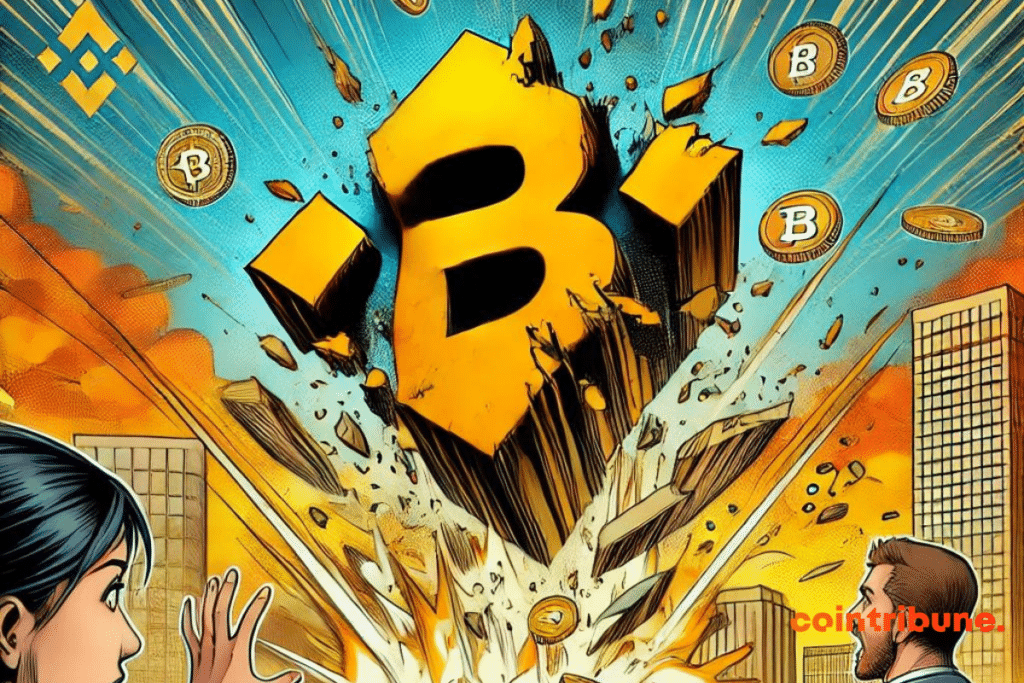End Of Reign For Binance
The crypto world is in perpetual turmoil, and even the giants can experience unexpected tremors. Binance, once the go-to trading platform, appears to see its empire waver. Indeed, its dominance in the crypto market is falling to a level not seen in four years, just as regulations are intensifying. But beyond the mere numbers, this slowdown raises deeper questions about the future of Binance. Is it the beginning of the end for the platform or just a readjustment in an evolving industry?

Binance facing a regulatory storm
For the past few years, Binance has been facing a headwind in the form of global regulation. Governments and regulators, after years of laissez-faire, are tightening the noose around cryptocurrency exchanges.
And Binance, at the top of the list, is bearing the full brunt of this new wave of restrictions. Last September, Binance’s market share in spot trading fell to just 27%, a level not seen since 2020. A tough blow for the platform that for years rode a wave of almost uncontested dominance.
Data from CCData is unequivocal: Binance’s trading volume fell by more than 20% in the space of a month. A decline largely explained by the many regulatory barriers that the platform faces.
Whether in Canada, the Netherlands, or Germany, Binance is forced to scale back its ambitions. The exit from the Canadian market, for example, is a strong symbol of this new era for Binance. As it struggles to operate in increasingly hostile jurisdictions, the exchange seems to be losing its luster.
This erosion of market share, especially in the derivatives segment where Binance held up to 41% of the market, reflects a more worrying situation: that of a platform whose global dominance is crumbling under the weight of regulations and legal pressures. The big question remains: how does Binance plan to react to this regulatory storm?
Increasingly fierce competition
If regulations put Binance in difficulty, they benefit its competitors. Platforms like OKX and Bybit, once in the shadows, are starting to nibble at market share.
In September, OKX dangerously approached Binance with an 18.4% market share in derivatives trading. Bybit, on the other hand, now holds 15.3% of the market, thereby solidifying its position as a credible challenger.
The fact that Binance no longer dominates as before shows a market evolution: traders are looking for alternatives, perhaps more in line with local regulations.
Moreover, some platforms have capitalized on this fragility of Binance by offering deals more suited to new regulatory realities.
The withdrawal of Binance from Canada, for example, has opened the door for other players to take its place, making the market more fragmented than before.
But the question remains: is this slowdown of Binance a temporary trend or a harbinger of a lasting loss of leadership? Current data seem to indicate that the platform is going through a difficult phase, but it still has resources and a loyal user base.
However, the path to regaining its dominance could be fraught with challenges, especially with regulators increasingly determined to oversee the cryptocurrency industry. Meanwhile, TRON dethrones Bitcoin and Ether.
Maximize your Cointribune experience with our "Read to Earn" program! For every article you read, earn points and access exclusive rewards. Sign up now and start earning benefits.

Fascinated by Bitcoin since 2017, Evariste has continuously researched the subject. While his initial interest was in trading, he now actively seeks to understand all advances centered on cryptocurrencies. As an editor, he strives to consistently deliver high-quality work that reflects the state of the sector as a whole.
The views, thoughts, and opinions expressed in this article belong solely to the author, and should not be taken as investment advice. Do your own research before taking any investment decisions.